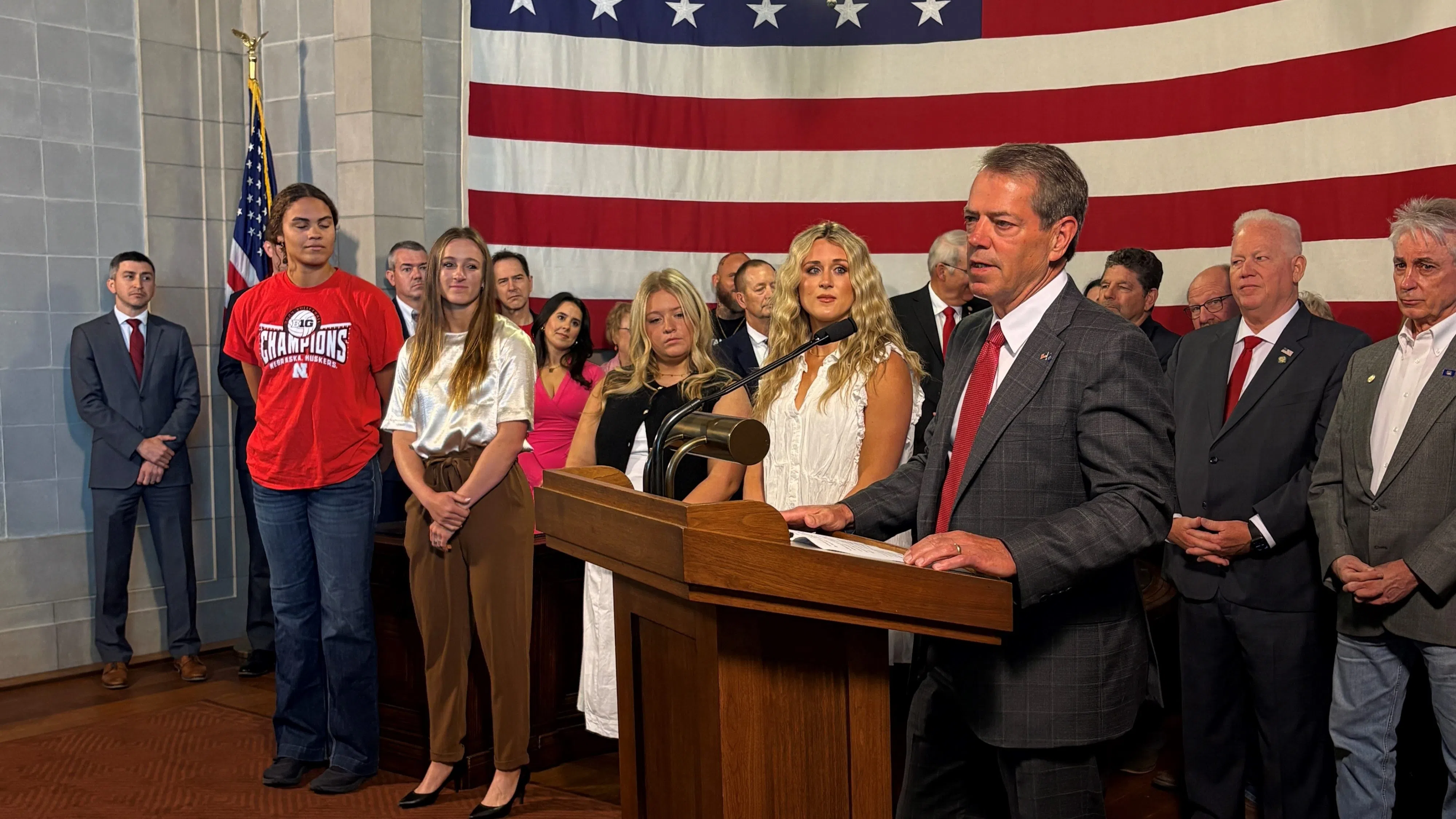All student-athletes competing in public K-12 or college sports in Nebraska are now legally restricted to teams matching their sex assigned at birth, following Governor Jim Pillen’s Wednesday morning signing of Legislative Bill 89.
In effect, the “Stand With Women Act” disallows students who identify as transgender from participating on sports teams under their identified gender. “Sex” is now defined in law by production of sperm or ovum. A student-athlete must verify their sex at birth with a doctor’s note before participating in single-sex sports.
Competitive sports at public schools will be limited to male and female, unless a sport is coed. Private schools must adopt a similar policy if they compete against public institutions. All the state’s public schools, community and state colleges will need to adopt a policy which complies with LB 89.
The new law, championed by State Senator Kathleen Kauth of Millard, will take effect September 3, in time for the fall sports season.
At the signing conference, Pillen was again joined by Husker Athletes Jordy Bahl, a softball pitcher, and Rebekah Allick, a volleyball middle-blocker, who threw their weight in influence behind the bill in January upon its introduction.
A similar cluster of Republican lawmakers also reappeared at the bill signing, as well as nationally known advocates Riley Gaines and Payton McNabb.
Gaines, a former University of Kentucky swimmer, has risen to prominence in the last few years as a political activist against transgender participation in athletics. In her final competitive event in 2022, Gaines tied for fifth place in the 200-yard NCAA freestyle championship with University of Pennsylvania swimmer Lia Thomas — the first openly trans woman champion in the NCAA women’s division after winning the 500-yard freestyle later in the same event.
While disappointed by her placement, and not being able to hold a fifth place trophy due to the draw, Gaines told The Daily Wire she was “I am in full support of her and full support of her transition,” but took issue with NCAA policy.
McNabb has also risen to prominence doing the same activism as Gaines. She played high school volleyball in North Carolina, where she suffered a traumatic brain injury after being hit with a volleyball during a match with a transgender player in 2022.
“I don’t think there’s, truthfully, a more worthy cause than to be here in Lincoln today with you guys, watching as Nebraska becomes the 28th state to protect women’s sports,” said Gaines at the signing.
Gaines and McNabb are both “ambassadors” with conservative lobbying group Independent Women’s Forum (IWF), which Kauth described as the “pioneers of this movement” during Wednesday’s conference.
“We were only able to get the athletic portion on, but I will be back next year bringing the bathrooms and the locker rooms,” Kauth said, referring to another portion of the original proposal which was dropped. “The work is not done. We’re going to continue.” Bahl echoed that there would be continued work “beyond the playing field.”
Pillen reiterated past comments that boys/men would “take care of whoever tries to go in the locker room or restroom [they’re not supposed to],” but said he was not suggesting violence when asked by reporters at the signing.
“We cannot ignore that girls and women have the right to a level playing field when it comes to sports,” said Gov. Pillen.
Allick said her activism on this issue was a “calling from God” and that her involvement was not political, but “common sense.”
“…and though the opposition may not see it now, I think somewhere deep in their soul, they know,” Allick said “Later on, just know we did it in their best interest, and their kids best interest.”
Whether these restrictions will impact any Nebraska Athletics programs is unclear. At several points, Kauth made unspecified claims of a Lincoln Southeast High School student “Briley” who “is having boys in her locker room and bathroom right now.” No athletic program was mentioned. Kauth said Briley’s parents “called me… to let me know that it’s going on there.”
Lincoln Public Schools declined a request for comment, saying they “cannot provide public comment on student privacy matters.”
Nationally, the issue’s prevalence also remains obscure. Anna Baeth, director of research at Athlete Ally, an organization that advocates for LGBTQ equality in sports, estimates fewer than 40 of the NCAA’s more than 500,000 athletes are known to be transgender.
Abbi Swatsworth, Executive Director of the nonprofit OutNebraska, said she was “disappointed” by the signing, telling Nebraska Examiner:
“Despite this harmful legislation, we stand together stronger this Pride [Month]. To the youth and their families who are struggling: We are with you. We will continue fighting this fight because you belong — yesterday, today and always. Trans people are brilliant, beautiful and resilient, and they belong here in our state.”
OutNebraska shared support hotline numbers for the Trevor Project (1-866-488-7386), National Suicide Prevention Lifeline (988) and Trans Lifeline (877-565-8860).








